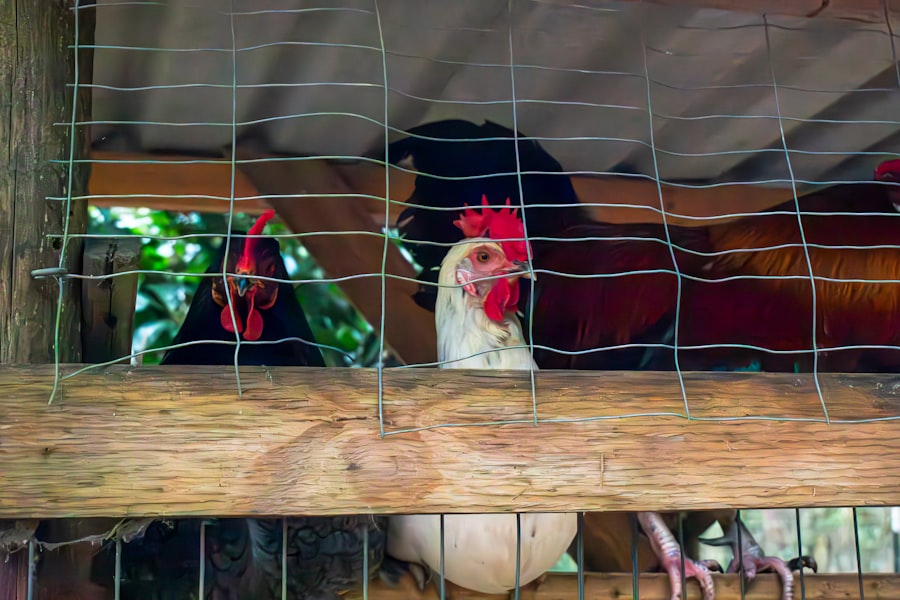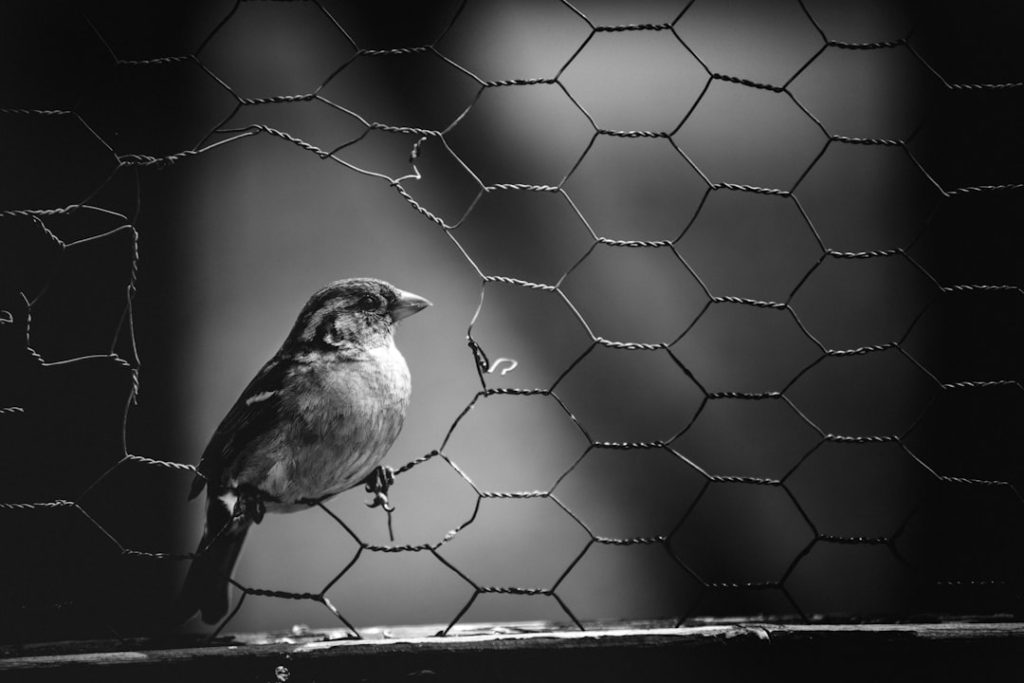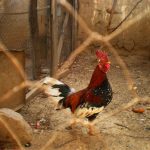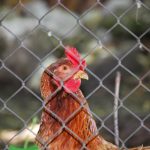Predator control is a significant challenge for poultry owners. Various animals pose threats to domestic birds, including wild predators such as foxes, raccoons, and coyotes, as well as domestic pets like dogs and cats. These animals can endanger the safety and health of poultry flocks, necessitating proactive protection measures.
Developing an effective predator control plan begins with understanding the behavior and habits of potential threats. Identifying common predators in the local area and their hunting patterns allows poultry owners to implement appropriate defensive strategies. Predatory birds also present a risk to poultry.
Raptors such as hawks and owls are adept hunters capable of preying on chickens and other small birds. Recognizing signs of predatory bird activity, including circling overhead or perching near coops, is crucial for implementing deterrent measures. Comprehending the complexities of predator control is essential for poultry owners to develop and maintain effective strategies that safeguard their flocks from harm.
This knowledge enables the implementation of appropriate protective measures tailored to specific predator threats in the local environment.
Table of Contents
- 1 Building a secure coop and run
- 2 Utilizing fencing and barriers
- 3 Implementing deterrents and repellents
- 4 Providing alternative sources of food and entertainment
- 5 Communicating with neighbors
- 6 Seeking professional advice and assistance
- 7 FAQs
- 7.1 What are some effective ways to keep chickens out of a neighbor’s yard?
- 7.2 Is it legal to keep chickens in a residential area?
- 7.3 How can I prevent my chickens from wandering into a neighbor’s yard?
- 7.4 What should I do if my chickens are causing problems in a neighbor’s yard?
- 7.5 Are there any natural deterrents to keep chickens out of a neighbor’s yard?
Key Takeaways
- Understanding the issue: Recognize the potential threats to your coop and run, such as predators and pests, and understand their behavior and habits.
- Building a secure coop and run: Use sturdy materials and secure all openings to prevent unauthorized access by predators.
- Utilizing fencing and barriers: Install fencing and barriers to create a physical barrier between your coop and potential threats.
- Implementing deterrents and repellents: Use natural or commercial deterrents and repellents to discourage predators and pests from approaching your coop and run.
- Providing alternative sources of food and entertainment: Offer alternative food sources and entertainment options to distract potential threats from targeting your coop and run.
- Communicating with neighbors: Keep open communication with neighbors to share information about potential threats and work together to address any issues.
- Seeking professional advice and assistance: Consult with professionals, such as wildlife experts or pest control services, for additional guidance and assistance in protecting your coop and run.
Building a secure coop and run
Using Sturdy Materials and Secure Fencing
A well-constructed coop and run will provide a safe and secure environment for your birds, keeping them protected from potential threats. When building a coop, it’s important to use sturdy materials that can withstand attempts by predators to break in. Additionally, make sure that all openings are securely covered with wire mesh to prevent predators from gaining access to your birds. The run should also be enclosed with wire mesh to prevent predators from digging underneath or climbing over the fence.
Designing a Predator-Proof Layout
In addition to using strong materials and secure fencing, it’s important to consider the layout and design of the coop and run. Make sure that there are no gaps or weak points where predators could potentially gain access.
Adding Extra Layers of Protection
It’s also a good idea to install motion-activated lights or alarms around the coop and run to deter predators from approaching. By building a secure coop and run, you can provide your poultry with a safe and protected environment where they can thrive without fear of predators.
Utilizing fencing and barriers

Fencing and barriers are essential tools for protecting your poultry from predators. By creating physical barriers around your property, you can prevent predators from gaining access to your birds. When choosing fencing materials, opt for sturdy options like chain link or welded wire that are difficult for predators to break through or climb over.
Make sure that the fencing is buried at least a foot underground to prevent predators from digging underneath. Additionally, consider adding an overhang or apron to the top of the fence to deter climbing predators like raccoons and cats. In addition to traditional fencing, consider using electric fencing as an added layer of protection.
Electric fencing delivers a mild shock to predators that come into contact with it, effectively deterring them from attempting to breach the barrier. Electric fencing can be particularly effective for deterring larger predators like coyotes and foxes. By utilizing fencing and barriers, you can create a secure perimeter around your property that will help keep your poultry safe from harm.
Implementing deterrents and repellents
In addition to physical barriers, there are a variety of deterrents and repellents that can help protect your poultry from predators. One effective option is predator urine, which can be purchased from hunting supply stores or online. By strategically placing predator urine around your property, you can create the illusion that a larger predator is present, deterring smaller predators from approaching.
Another option is motion-activated sprinklers, which can startle and deter predators when they approach your coop and run. For aerial predators like hawks and owls, visual deterrents can be effective at keeping them at bay. Reflective tape or shiny objects hung around the coop and run can create visual disturbances that make it difficult for predatory birds to approach.
Additionally, scarecrows or decoy predators like plastic owls or hawks can help deter aerial predators from targeting your poultry. By implementing a combination of deterrents and repellents, you can create an environment that is unappealing to predators, reducing the risk of harm to your flock.
Providing alternative sources of food and entertainment
One way to reduce the risk of predation on your poultry is to provide alternative sources of food and entertainment for potential predators. By offering food sources that are more appealing than your birds, you can help deter predators from targeting your flock. For example, consider setting up feeding stations for wild animals away from your coop and run, providing them with an alternative food source that will reduce their incentive to hunt your poultry.
In addition to alternative food sources, providing entertainment for potential predators can also help keep them away from your birds. For example, setting up bird feeders or providing toys for domestic pets can help distract them from targeting your poultry. By offering alternative sources of food and entertainment, you can help reduce the likelihood of predation on your flock.
Communicating with neighbors

In some cases, working with neighbors can be an effective way to address predator control issues. By communicating with neighbors about potential predator threats in the area, you can work together to develop a comprehensive strategy for protecting your poultry. For example, if one neighbor has experienced issues with a particular predator, they may be able to share valuable insights and strategies for deterring it.
Collaborating on Community-Level Predator Control
Additionally, by working together to address predator control on a community level, you can create a more cohesive and effective defense against potential threats. In addition to sharing information and strategies with neighbors, consider collaborating on predator control measures that benefit the entire community. For example, organizing neighborhood clean-up efforts to remove potential hiding spots for predators or coordinating the installation of deterrents like motion-activated lights or alarms can help create a safer environment for everyone’s poultry.
Creating a Stronger Defense
By communicating with neighbors and working together on predator control efforts, you can create a stronger defense against potential threats.
Seeking professional advice and assistance
If you’re struggling to effectively address predator control issues on your own, don’t hesitate to seek professional advice and assistance. Wildlife experts, pest control professionals, and agricultural extension agents can provide valuable insights and guidance on developing an effective predator control plan. These professionals can help you identify specific predator threats in your area and recommend targeted strategies for deterring them.
In addition to seeking professional advice, consider enlisting the help of experienced contractors or specialists who can assist with implementing predator control measures on your property. Whether it’s installing secure fencing, setting up motion-activated deterrents, or implementing other protective measures, professionals can help ensure that your predator control efforts are effective and sustainable. By seeking professional advice and assistance, you can gain access to valuable expertise and resources that will help protect your poultry from harm.
In conclusion, protecting your poultry from predators requires a comprehensive approach that addresses both physical defenses and behavioral deterrents. By understanding the behavior and habits of potential predators, building secure coops and runs, utilizing fencing and barriers, implementing deterrents and repellents, providing alternative food sources and entertainment, communicating with neighbors, and seeking professional advice and assistance, you can create a safe environment for your flock to thrive without fear of predation. With careful planning and proactive measures, you can effectively protect your poultry from potential threats and ensure their safety and well-being.
If you’re looking for more information on how to keep chickens in your own yard, you might want to check out this article on what kind of coop is best for chickens. It can provide valuable insights on creating a suitable environment for your chickens and keeping them contained within your property.
FAQs
What are some effective ways to keep chickens out of a neighbor’s yard?
Some effective ways to keep chickens out of a neighbor’s yard include building a fence around your property, using chicken wire or netting to create a barrier, and providing adequate space and enrichment in your own yard to discourage chickens from wandering.
Is it legal to keep chickens in a residential area?
Laws regarding keeping chickens in residential areas vary by location. It is important to check local zoning laws and regulations to ensure compliance with any restrictions on keeping chickens in your area.
How can I prevent my chickens from wandering into a neighbor’s yard?
To prevent chickens from wandering into a neighbor’s yard, it is important to provide a secure and enclosed space for them to roam in your own yard. Regularly inspecting and maintaining any fencing or barriers can also help prevent chickens from escaping.
What should I do if my chickens are causing problems in a neighbor’s yard?
If your chickens are causing problems in a neighbor’s yard, it is important to address the issue promptly and respectfully. This may involve discussing the situation with your neighbor, implementing measures to keep the chickens contained, or seeking guidance from local authorities if necessary.
Are there any natural deterrents to keep chickens out of a neighbor’s yard?
Some natural deterrents to keep chickens out of a neighbor’s yard include planting certain types of vegetation that chickens find unappealing, such as prickly bushes or strong-smelling herbs. Additionally, using motion-activated sprinklers or other non-harmful deterrents may help discourage chickens from entering a neighbor’s yard.
Meet Walter, the feathered-friend fanatic of Florida! Nestled in the sunshine state, Walter struts through life with his feathered companions, clucking his way to happiness. With a coop that’s fancier than a five-star hotel, he’s the Don Juan of the chicken world. When he’s not teaching his hens to do the cha-cha, you’ll find him in a heated debate with his prized rooster, Sir Clucks-a-Lot. Walter’s poultry passion is no yolk; he’s the sunny-side-up guy you never knew you needed in your flock of friends!







